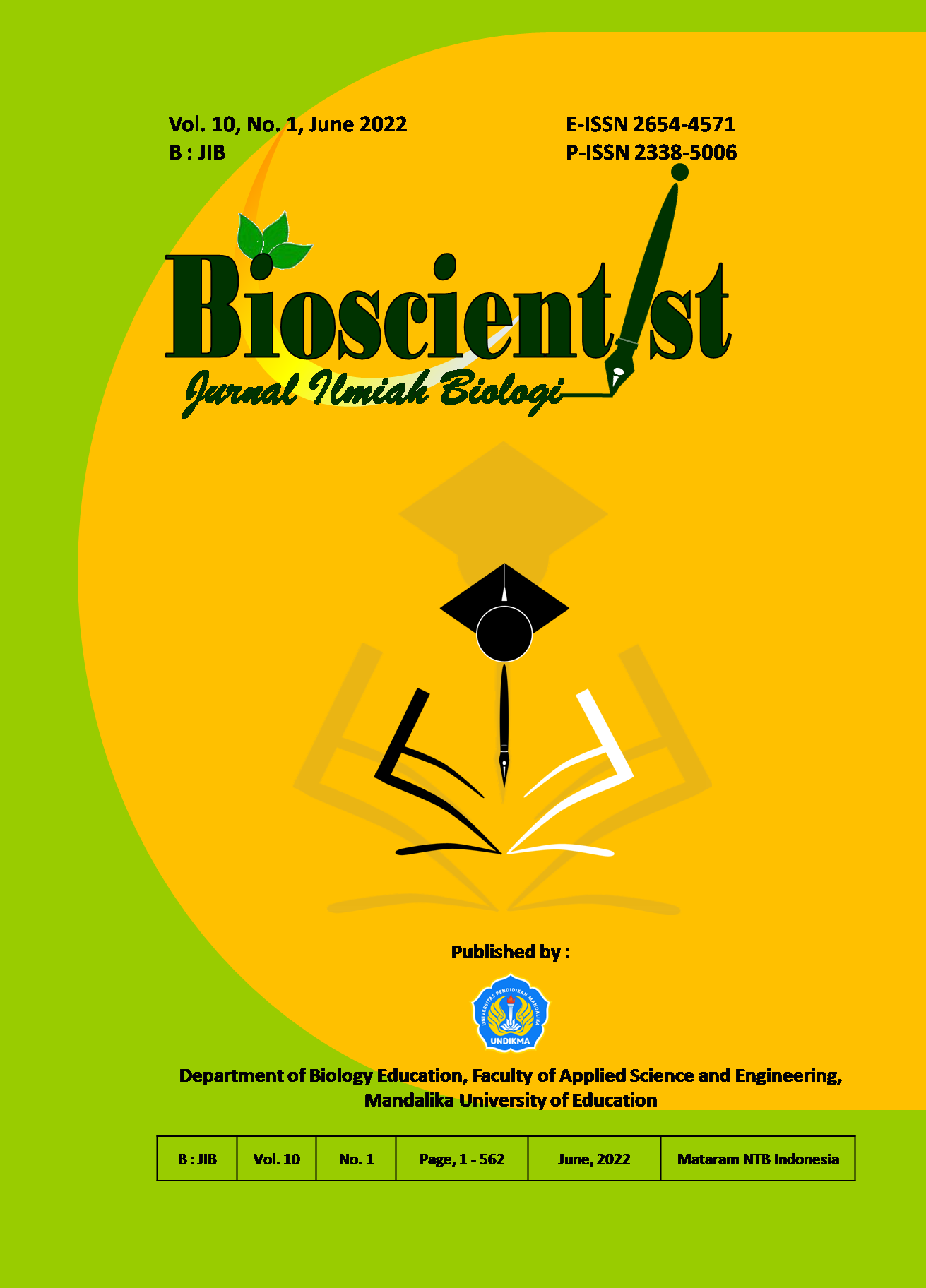Implikasi Model Pembelajaran Modified Free Inquiry terhadap Kemampuan Tree Thinking Peserta Didik SMA pada Materi Kingdom Animalia
DOI:
https://doi.org/10.33394/bioscientist.v10i1.5340Keywords:
Modified Free Inquiry, Tree Thinking Skill, Animalia.Abstract
References
Arikunto, S. (2013). Prosedur Penelitian: Suatu Pendekatan Praktik. Jakarta: Rineka Cipta.
Eristya, A.M., dan Aznam, N. (2019). Natural Science Learning with Modified Free Inquiry to Develop Students’ Creative Thinking Skills. In International Seminar on Science Education (pp. 1-8). Yogyakarta, Indonesia : IOP Publishing Ltd.
Fatmawati, M. (2021). Pengaruh Mode Pembelajaran Modified Free Inquiry terhadap Kemampuan Kognitif Peserta Didik Kelas VII Materi Sistem Pencernaan pada Manusia. Skripsi. Universitas Islam Negeri Raden Intan Lampung.
Kemendikbud. (2016). Kompetensi Inti dan Kompetensi Dasar Pelajaran pada Kurikulum 2013 pada Pendidikan Dasar dan Pendidikan Menengah. Jakarta: Kementrian Pendidikan dan Kebudayaan.
______. (2018). Perubahan atas Peraturan Menteri Pendidikan dan Kebudayaan Nomor 24 tahun 2016 tentang Kompetensi Inti dan Kompetensi Dasar Pelajaran pada Kurikulum 2013 pada Pendidikan Dasar dan Pendidikan Menengah. Jakarta: Kementrian Pendidikan dan Kebudayaan.
Kholilurrohman, K., dan Suryadarma, I.G.P. (2019). The Effect of Modified Free Inquiry Approach on Student’S Process Skill and Science Attitudes. Journal of Science Education Research, 3(1), 67-80.
Kummer, T.A., Whipple, C.J., and Jensen, J.L. (2016). Prevalence and Persistence of Misconceptions in Tree Thinking. Journal of Microbiology & Biology Education, 17(3), 389-398.
Mendala., Muldayanti, D.N., dan Heriansyah. (2019). Pengaruh Model Pembelajaran Kooperatif Tipe NHT Berbantuan Media Flash terhadap Hasil Belajar Siswa Materi Kingdom Animalia di MAN 2 Pontianak. Pena Kreatif: Jurnal Pendidikan, 7(2), 42-52.
Morrison, D.A. (2013). Tree Thinking: An Introduction to Phylogenetic Biology. David A. Baum and Stacey D. Smith. Systematic Biology, 62(4), 634-637.
Mutiara, E., Juhanda, A., dan Ramdhan, B. (2020). The Emergence Profile of Tree Thinking of Senior High School Students Through the Inquiry Based Learning Model. Jurnal Mangifera Edu, 5(1), 18-25.
Novick, L.R., and Catley, K.M. (2013). Reasoning About Evolution’s Grand Patterns: College Students’ Understanding of the Tree of Life. American Educational Research Journal, 50(1), 138-177.
______. (2016). Fostering 21st-Century Evolutionary Reasoning: Teaching Tree Thinking to Introductory Biology Students. CBE Life Sciences Education, 15(4), 1-12.
______. (2018). Teaching Tree Thinking in an Upper Level Organismal Biology Course: Testing The Effectiveness Of A Multifaceted Curriculum. Journal of Biological Education, 52(1), 66-78.
Nurdyansyah., dan Fahyuni, E.F. (2016). Inovasi Model Pembelajaran. Sidoarjo: Nizamia Learning Centre.
Pratiwi, R.D. (2015). Penerapan Constructive Controversy dan Modified Free Inquiry terhadap HOTS Mahasiswa Pendidikan Biologi. Formatif: Jurnal Ilmiah Pendidikan MIPA, 4(2), 100-111.
Putri, E.P.K., Hamzah, H.B., dan Tiwow, V.M.A. (2017). Perbedaan Model Pembelajaran Modified Free Inquiry (MFI) Berbasis Laboratorium Riil dengan Virtual pada Pokok Bahasan Laju Reaksi terhadap Hasil Belajar Kimia Siswa SMAN 1 Pasangkayu. Jurnal Mitra Sains, 5(1), 26-35.
Sari, P.A. (2019). Analisis Kemampuan Tree Thinking dan Hubungannya dengan Penguasaan Konsep Siswa pada Materi Tumbuhan Biji. Thesis. Universitas Pendidikan Indonesia.
Smith, J.J., Cheruvelil, K.S., and Auvenshine, S. (2013). Assessment of Student Learning Associated with Tree Thinking in an Undergraduate Introductory Organismal Biology Course. CBE Life Sciences Education, 12(3), 542-552.
Sugiyono. (2017). Metode Penelitian Pendidikan: Pendekatan Kuantitatif, Kualitatif, dan R&D. Bandung: CV. Alfabeta.
Sundayana. (2016). Statistika Penelitian Pendidikan. Bandung: CV. Alfabeta.













